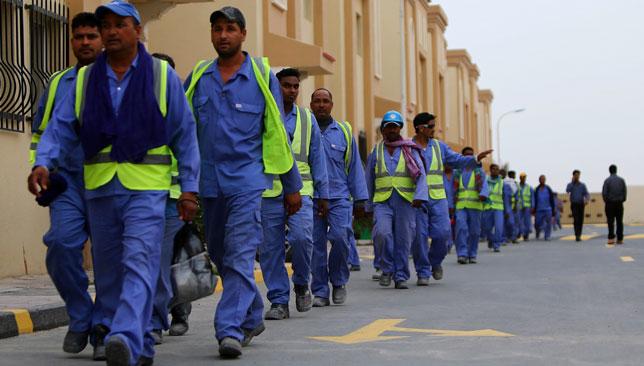
Qatar’s pledge to abolish its controversial “kafala” labour system by the end of 2015 is in doubt after Doha’s main consultative body expressed serious concerns about proposed reforms.
– Ones to watch: 5 Saudi players who could play in Europe
– #360view: Simeone quietly building elite Atletico squad
– GALLERY: The colourful fans bringing Copa 2015 to life
Despite expectations that Qatar was close to announcing the end of “kafala”, the country’s Shura Council said a draft law could not yet be introduced and needed further examination, according to the Arabic-language newspaper Al Sharq.
The council’s chairman Mohammed bin Mubarak al-Khulaifi also said there was “no need to hurry” in introducing the reforms, despite the government saying earlier this year that “kafala” would almost certainly be scrapped by December.
The council also appeared to propose introducing other reforms, including punishing foreign workers who “deliberately” create problems.
Government officials confirmed that further consultations would take place on the proposed changes to the system, which governs Qatar’s vast army of foreign workers.
Qatar on @Snapchat story today. Maybe a worker will show us his conditions while he slaves away at the WC stadiums #Doha_Live #injustice
— Mr. Manny (@MannysMusings) June 15, 2015
It means the timetable set in May by the country’s minister of labour and social affairs could now be in doubt.
Abdullah bin Saleh al-Khulaifi said then that he was “90 percent” certain the “kafala” system, which critics have likened to modern-day slavery, would be replaced by new legislation by the end of this year.
“Kafala” has been widely blamed for enabling the abuse of foreign workers, especially labourers involved in the country’s vast infrastructure projects, at the hands of unscrupulous bosses.
The Shura Council said it wants to keep a two-year ban on issuing new papers to expat workers who leave Qatar after the cancellation of their work visa.
Any new law should not allow foreign workers to change jobs more than twice, it said.
And it wants to include a provision that any foreign worker who deliberately creates problems for employers should not be allowed to change jobs.
The planned law would force problematic employees to work with the same employer for double the length of the contract, which could mean up to 10 years, as compensation.
There are an estimated 1.6 million migrant labourers working in Qatar, but that number is set to top two million ahead of the football World Cup in 2022.
The potential delay comes despite international criticism of Qatar’s labour laws and the slow pace of reform.
Preparations of 2022 FIFA world cup in Qatar . see the beautiful fabulous awesome grounds in qatar. i like it pic.twitter.com/JLbg5R1ogj
— Majeed Mahmood (@MajeedMahmood2) June 20, 2015
– ‘Regressive proposals’ –
Amnesty International voiced its surprise over Qatar’s announcement.
“These are very regressive proposals which would further restrict the rights of migrant workers,” Amnesty’s Mustafa Qadri told AFP.
“We would think that this is the time for Qatar to show leadership and respect rights and the rule of law. This seems to be going in a completely different direction.”
Up to today, 1,200 people have died working in Qatar world cup stadium. Only 2 people died when working for the S. Africa 2010 world cup.
— Hannibal (@mokayah) June 21, 2015
Qadri added that the issue of reform “is not going away” and said that “global attention” would remain on Qatar.
Any delay in reform is likely to lead to yet more criticism of the decision to allow Qatar to host the 2022 World Cup.
The latest development comes as the country is under the spotlight in the fallout from corruption allegations which have engulfed football’s governing body, FIFA.
Last week Swiss Attorney General Michael Lauber said prosecutors were investigating 53 cases of possible money laundering as they look into FIFA’s handling of bids for the 2018 and 2022 World Cups.
Senior FIFA official Domenico Scala has said there could be a revote for the 2018 and 2022 World Cups if there was evidence of wrongdoing in the bidding process.